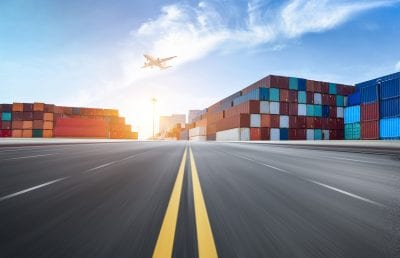The start of the new decade marks significant shifts in the logistics and transportation industry. Recent years have brought contradictory and fast-growing trends to the spotlight, shaping the future of sustainability in logistics and supply chain management. The digital revolution, industry automation, self-driven trucks, robotic devices, blockchain-enabled supply chains, and many more topics have sparked heated discussions in the industry. Whether these shifts will take 10 or 50 years, the process has already begun. The 2020 logistics outlook forecasts some big and fresh trends in transportation and logistics, transforming the logistics environment as we know it and driving the industry towards net zero goals.
2020 Logistics Outlook: What Is Trending?
Supply Chain Transformations
Many experts believe that transformations in sustainable logistics and supply chain management are on the horizon. For example, supply chains are shifting from linear, end-to-end models to circular (especially complex ones). The circular model makes it easier to manage returns, recycling, restocking, and other live processes in supply chains more efficiently. As companies become more conscious of brand responsibility and their environmental impact, the trend of a more versatile and multi-angled supply chain will remain a hot topic in supply chain sustainability trends for the upcoming years. This shift towards circular models is a sustainable logistics example that demonstrates how companies are adapting to reduce their carbon footprint. Additionally, logistics durable manufacturing is emerging as a key component of these circular supply chains, emphasizing the production of long-lasting goods that can be easily repaired, refurbished, or recycled.

Sustainability in Logistics
With increasing focus on sustainability in logistics and supply chain management, going green will become even more essential for companies in the coming year. Eco-initiatives are driving many other trends like alternative energy and automation, making it one of the most visible and promising tendencies in logistics in 2020. Green logistics companies will firstly focus on optimization powered by technology. Using advanced AI-based software will enable businesses to develop routes with fewer emissions, which is an example of considering sustainability in the distribution and shipping process.
Other smart solutions include automated vehicles and devices to enhance last-mile delivery, contributing to eco-friendly logistics. Sustainable logistics companies are increasingly adopting electric vehicles and exploring renewable energy options, such as solar installations, to reduce their carbon footprint. These sustainable logistics practices not only benefit the environment but also help companies achieve their sustainability goals tracking and overall sustainability strategy. Energy management systems are being implemented to optimize resource usage and further reduce environmental impact, aligning with the broader goals of sustainability in logistics and supply chain management.
Hyper Automation
Apart from self-driving trucks and other innovations that many industry players are hesitant about, automation in the logistics of the future is way more versatile and approachable. These processes can be combined under the hyper automation phenomenon, which includes all automating processes like analysis, data gathering, forecasting, measuring, and monitoring. Ultimately, hyper automation implies everything from functional software, equipment, robotics, vehicles, tracking tools, and any other assets that can reduce the necessity of human intervention.
Logistics initiatives in this area focus on implementing IoT sensors for real-time tracking and analytics tools for better decision-making. Route optimization and network optimization are becoming crucial aspects of sustainable logistics management, helping companies reduce their carbon emissions and improve overall efficiency. Load consolidation strategies are being employed to maximize vehicle capacity and minimize trips, further contributing to carbon emissions reduction. These advancements in automation are also benefiting logistics durable manufacturing processes, enabling more efficient production and distribution of long-lasting goods.
Apart from relatively fresh trends, there will be an increased demand for better tracking and tracing capabilities to deliver more visibility into supply chains. Generally, more integrated networks will be appearing in the industry to better connect carriers, shippers, and others involved in operations. With a forecasted boom in logistics startups and logistics-focused technology, there is a lot to expect from new software and tech solutions in the realm of sustainable logistics and supply chain management.
Experts also emphasize small and medium businesses going global and getting more access to huge supply chains. Since SMEs produce a very significant rate in GDP and account for 95 percent of all companies, their growing presence in the market will positively impact the industry and the economy in general. This shift presents an opportunity for these businesses to adopt eco-friendly shipping practices and contribute to the broader sustainability trend in the logistics sector.
As the logistics industry continues to evolve, we can expect to see more focus on decarbonization efforts, including the use of Sustainable Aviation Fuel, electrified fleets, and innovative solutions for eco-friendly deliveries. Companies will increasingly prioritize the measurement and reduction of Scope 3 emissions, collaborating with partners across the supply chain to achieve comprehensive sustainability goals. This emphasis on collaborative partnerships will be crucial in addressing industry-wide challenges and meeting increasingly stringent sustainability regulations.
Fleet modernization efforts are underway across the industry, with companies investing in more fuel-efficient vehicles and exploring alternative power sources. These efficiency upgrades not only reduce operational costs but also significantly decrease the environmental impact of logistics operations. As emission data becomes more readily available and accurate, companies can better track their progress towards carbon emissions reduction targets and make data-driven decisions to improve their sustainability performance.
In conclusion, the future of logistics is undoubtedly green and tech-driven. From supply chain sustainability to advanced automation and eco-friendly practices, the industry is poised for significant transformations. As companies strive to balance efficiency, cost-effectiveness, and environmental responsibility, we can expect to see continued innovation and collaboration in creating a more sustainable and resilient logistics sector. The adoption of green practices, coupled with technological advancements and a focus on sustainability in logistics and supply chain management, will pave the way for a more environmentally conscious and efficient logistics industry in the years to come. This includes the continued development of logistics durable manufacturing processes, which will play a crucial role in creating more sustainable and circular supply chains.
